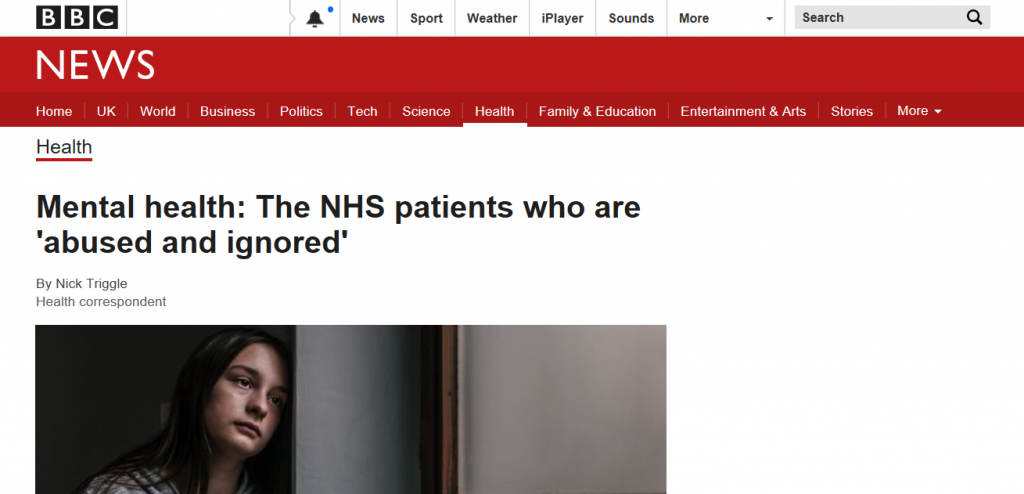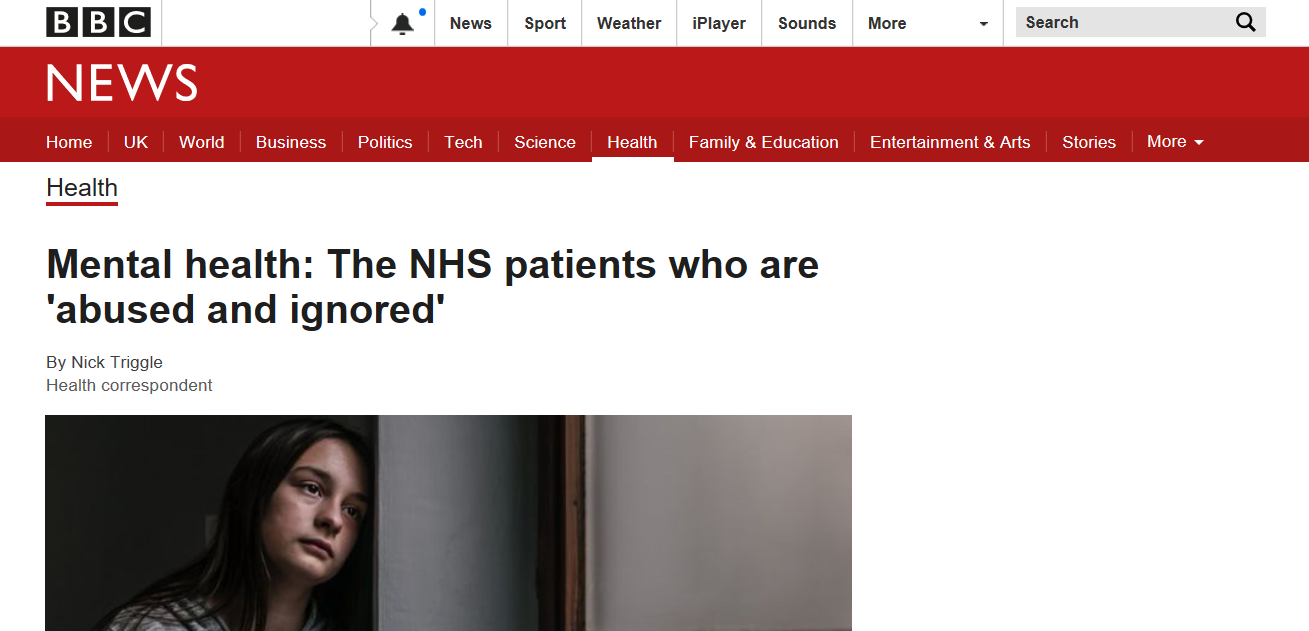Nick Triggle of BBC News reports:
New rights should be given to severely ill mental health patients detained in hospital to stop abuse and neglect of this vulnerable group, a review says.
The 1983 Mental Health Act is outdated and needs an overhaul, sectioning is being misused and does not properly protect patients’ rights, it says.
The independent review – ordered by the government – heard from patients who had suffered during their detentions.
The prime minister said the injustices were unacceptable and promised action.
This all sounds very reasonable.
We’re looking forward to reading the full report.
But we are worried that the language of human rights may be used to justify the removal of some statutory obligations of the state to help people in mental health crisis.
And it isn’t true that there haven’t been changes since 1983: the Mental Health Act was last amended in 2007, the Mental Capacity Act was enacted in 2005 and the Mental Health Act Code of Practice was last revised in 2015. We are worried about why there is the need for the spin.
A woman from East Anglia tells the BBC about her experiences:
Kate King, 56, spent seven years in and out of hospitals in East Anglia after being admitted in 2004 following a period of post-natal depression.
She said her detention probably saved her life as she had been really struggling following the birth of her two children but her experience, in a variety of units, had been “awful” at times.
“I was abused and ignored. I lost my voice,” she said.
She said she had experienced other patients being aggressive and swearing at her, with one even stalking her.
But she also complained about her treatment at the hands of staff.
“I was restrained face down on a mattress. One nurse even told me I should kill myself,” she said.
Sadly, we hear this too often: the voices of service users and carers need to be heard and the quality of inpatient care must improve.
But there is the case of people who need admission who cannot get a bed.
Frequently, we hear that people are refused voluntary admission because there are no beds available or because they are ‘just suicidal’.
That mental health professionals increasingly refuse to carry out a mental health assessment which is likely to result in detention unless a bed has been found in advance.
That people refuse a voluntary admission because they are unwilling to travel to other end of the country for a hospital bed.
Which leaves mental health professionals with the unsatisfactory choice of either sectioning somebody to send them miles away from their friends and family when they would accept voluntary admission without detention to a local bed or abandoning admission as an option. Sometimes, too frequently, people refused local help die.
The 18-month review recommended a number of changes, including:
- new rights for patients to legally challenge their treatment
- more frequent opportunities to challenge detention
- legally binding advanced care plans so patients could express how they wanted to be treated if they were sectioned
- a requirement for doctors to record when and why they chose to ignore patient requests
- an end to police cells being used as a place of safety and less frequent use of police cars to transport patients
- the right to choose a “nominated person” to have control of a patient’s care if they were sectioned – at the moment it automatically goes to their nearest relative
Obviously we would far rather that crises are prevented and that people are treated in the community rather than detained against their will in hospital.
But the police are just picking up the pieces of the crisis in mental health services.
We know that frequently it is extremely difficult, if not impossible, to secure a voluntary admission to hospital.
We know of people in acute distress being handcuffed to their beds overnight whilst psychotic and without control of their bodily functions because there isn’t a mental health bed. Or of people kicking the wing mirrors off police cars outside the Norfolk Police HQ in Wymondham to get arrested as it was the only way they felt they could get help.
We don’t believe the police want to handcuff patients to their beds or arrest the mentally ill to secure their treatment. Remember that Norfolk Police were forced to develop a standard letter protesting at the police infringing people’s human rights due to the lack of beds.
Professor Sir Simon Wessely, who chaired the review, said it was time to bring the act up to date.
“It was written when people with a mental health problem were something to be afraid of. But the way we think about mental health and illness has changed dramatically, so now they are more likely to be seen as people to be helped.
“The act needs to help them more – to make it easier for people to express their choices and preferences about how they want to be treated and harder for them to be ignored.”
He added black and ethnic minorities along with people with learning disabilities and autism appeared to be particularly ill-served by the act as they had higher rates of detention.
Our experiences of Lord Sir Simon Wessely have not been overwhelmingly positive, to say the least.
Will the review say enough about resources?
Interestingly, the BBC article says detentions have risen forty per cent and that the average cost is £18,000. Given the 49,500 detentions per year, that means the annual cost is about £891 million.
Is the government motivated by saving money?
Will the government implement the expensive recommendations as well as the recommendations that will cut costs?
Sir Simon said there is no one reason for the increase but added that it is partly down to society becoming more “risk averse” but also because there are fewer alternatives to detention.
The rise in population will account for a small proportion of the rise but beyond that there is concern the act may be being misused.
It isn’t just aversion to risk. Often, in Norfolk and Suffolk, after savage cuts, the only way to get help is to be detained under the Mental Health Act which places a statutory duty on the NHS to find a bed.
But they acknowledge the changes will require greater investment in community services, particularly crisis care to stop people deteriorating to such an extent that they need hospital treatment.
What we can’t have nationally is what happened in Norfolk and Suffolk – the closure of beds while they were still needed despite being promised that this would not happen. There needs to be the investment in community services first and only if it is demonstrated that there are too many beds should beds be closed.
The article quotes two highly-paid ‘executives’ from mental health ‘charities’ which receive more than half of their funding from the government:
Mind chief executive Paul Farmer said the legislation was outdated, with thousands of people every year having to endure “poor treatment”.
Mark Winstanley, of Rethink Mental Illness, said the charity had “long campaigned” for reform of the act.
“Countless people have told us how they felt disrespected and lost all control of their care while treated under the act,” he said.
We would rather have heard from service users, carers and front line mental health professionals. Maybe even an Approved Mental Health Professional (AMHP)?
We’d say lack of money is a bigger problem than the Mental Health Act. Many of the admirable intentions of the recently-revised Mental Health Act Code of Practice have been undermined by lack of resources.
And even doctors acknowledged change was needed. Royal College of Psychiatrists president Prof Wendy Burn said detention was clearly “incredibly stressful” for patients and there needed to be a focus on improving their experiences.
Why is it ‘even doctors’ when health professionals have long campaigned for decent mental health services and were instrumental in founding our campaign?
Professor Wendy Burn is a profoundly decent woman. ‘Even doctors’ is just insulting.
Prime Minister Theresa May said the review would be used to make changes to the legislation.
“The disparity in our mental health services is one of the burning injustices this country faces that we must put right,” she said.
“For decades, it has somehow been accepted that if you have a mental illness you will not receive the same access to treatment as if you have a physical ailment. Well, that is not acceptable.”
Theresa May is correct that it is unacceptable but the situation would not be nearly as desperate without the massive cuts to mental health and council budgets over the past decade.
Will the necessary money follow the fine words?

